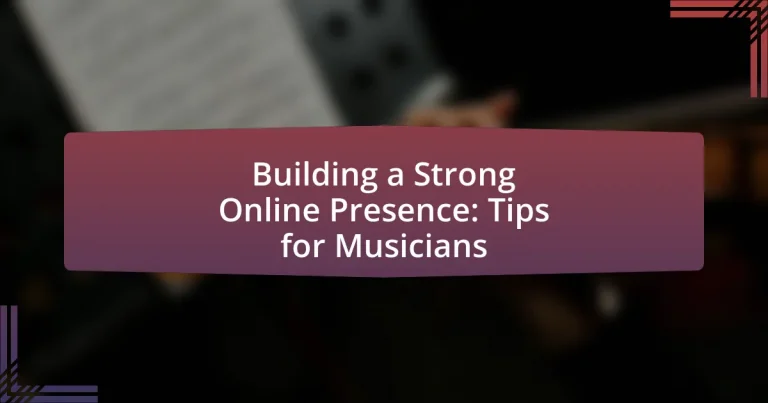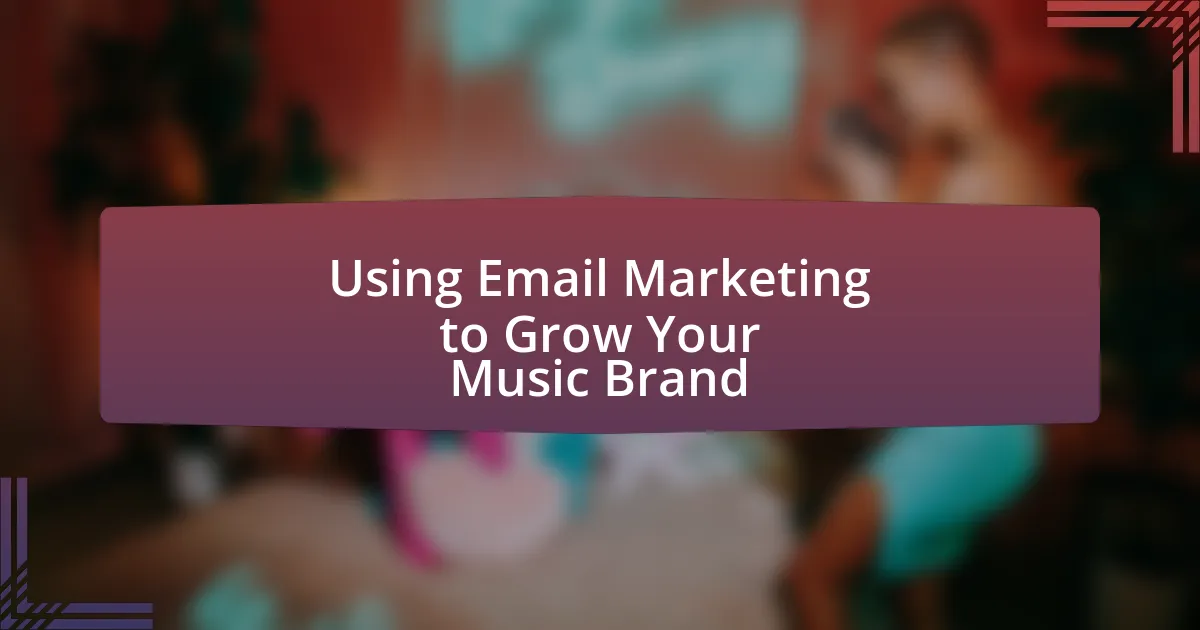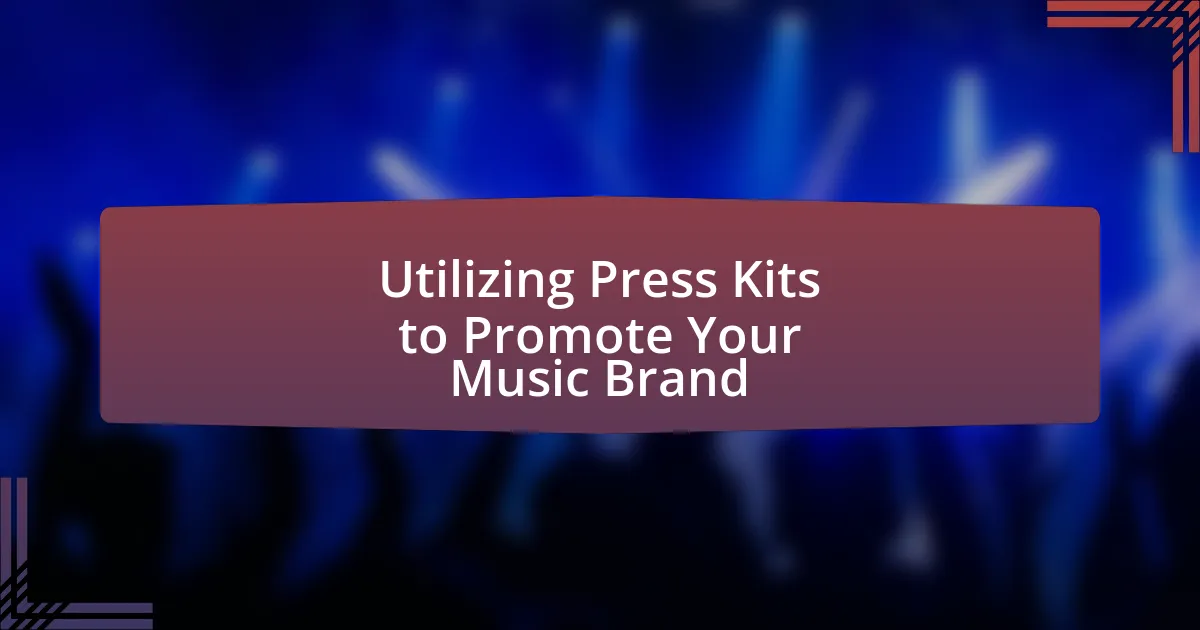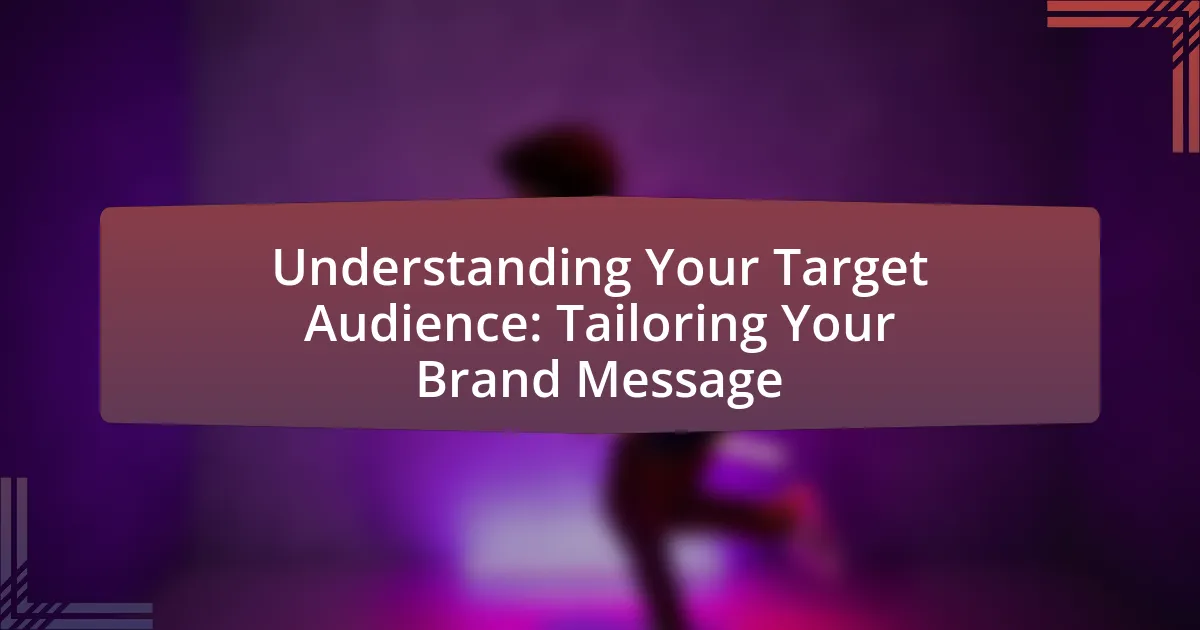Building a strong online presence is essential for musicians to promote their music, engage with fans, and establish a recognizable brand. This article outlines the importance of digital platforms, such as social media and streaming services, in enhancing visibility and accessibility. Key components of a successful online presence include a professional website, active social media engagement, consistent branding, and quality content creation. The article also discusses strategies for effective promotion, common mistakes to avoid, and practical steps musicians can take to start building their online presence today. By leveraging these insights, musicians can significantly impact their career growth and audience engagement.
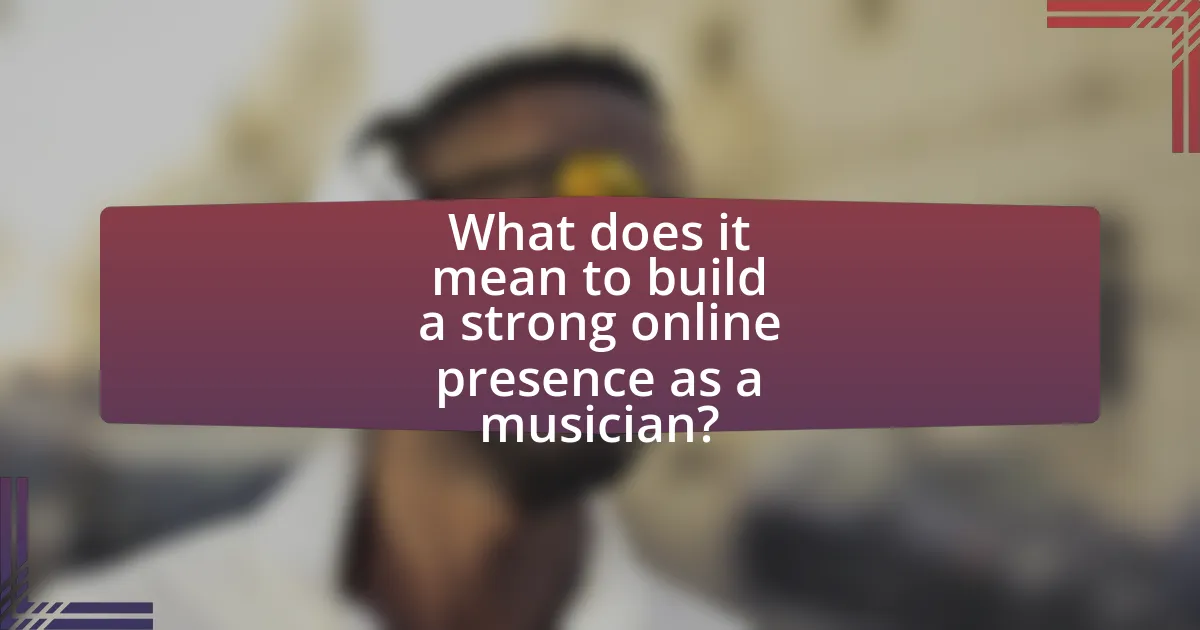
What does it mean to build a strong online presence as a musician?
Building a strong online presence as a musician means effectively utilizing digital platforms to promote music, engage with fans, and establish a recognizable brand. This involves creating and maintaining profiles on social media, streaming services, and personal websites, which collectively enhance visibility and accessibility. According to a 2021 survey by the Music Industry Research Association, 85% of musicians reported that social media significantly contributed to their fan engagement and music discovery. Thus, a strong online presence not only increases audience reach but also fosters community interaction and loyalty among listeners.
Why is an online presence important for musicians?
An online presence is crucial for musicians because it enables them to reach a wider audience and engage with fans directly. In today’s digital age, platforms like social media, streaming services, and personal websites allow musicians to showcase their work, promote events, and build a brand. According to a 2021 survey by the Music Industry Research Association, 85% of music consumers discover new artists through online platforms, highlighting the importance of digital visibility. Furthermore, an effective online presence can lead to increased opportunities for collaborations, sponsorships, and live performances, ultimately contributing to a musician’s career growth and sustainability.
How does an online presence impact a musician’s career?
An online presence significantly enhances a musician’s career by increasing visibility and accessibility to a global audience. Musicians can share their work through platforms like social media, streaming services, and personal websites, which allows them to reach fans beyond their local area. According to a 2021 report by the International Federation of the Phonographic Industry, 70% of music consumption now occurs through digital platforms, highlighting the importance of an online presence in connecting with listeners. Furthermore, musicians with active online engagement can build a loyal fan base, leading to increased opportunities for live performances, collaborations, and revenue through merchandise sales.
What are the consequences of lacking an online presence?
Lacking an online presence significantly limits a musician’s ability to reach and engage with their audience. Without a digital footprint, musicians miss opportunities for promotion, networking, and fan interaction, which are crucial in today’s music industry. According to a 2020 survey by the International Federation of the Phonographic Industry, 80% of music consumers discover new artists through online platforms. This statistic underscores the importance of being visible online; without it, musicians risk obscurity and reduced sales. Furthermore, a lack of online presence can hinder collaboration opportunities with other artists and industry professionals, as many rely on social media and websites to connect and share work.
What are the key components of a strong online presence?
The key components of a strong online presence include a professional website, active social media engagement, consistent branding, quality content creation, and effective search engine optimization (SEO). A professional website serves as the central hub for information and showcases an artist’s work, while active social media engagement fosters community interaction and audience growth. Consistent branding across platforms ensures recognition and trust, and quality content creation, such as music releases and behind-the-scenes insights, keeps the audience engaged. Effective SEO practices enhance visibility in search results, making it easier for potential fans to discover the artist. These components collectively contribute to a musician’s ability to connect with their audience and build a loyal fan base.
Which social media platforms should musicians focus on?
Musicians should focus on Instagram, TikTok, and YouTube as their primary social media platforms. Instagram allows musicians to share visually engaging content and connect with fans through stories and posts, with over 1 billion monthly active users. TikTok has rapidly gained popularity for its short-form video content, making it an effective platform for viral music promotion, as evidenced by the fact that 67% of users discover new music on the app. YouTube serves as a crucial platform for music videos and live performances, boasting over 2 billion monthly users, which provides musicians with a vast audience for their work.
How can a musician create an engaging website?
A musician can create an engaging website by incorporating visually appealing design, user-friendly navigation, and interactive elements. A visually appealing design captures visitors’ attention, while user-friendly navigation ensures that fans can easily find music, tour dates, and merchandise. Interactive elements, such as embedded music players and social media feeds, encourage visitor engagement and foster a sense of community. According to a study by the Nielsen Norman Group, users form opinions about a website within 50 milliseconds, highlighting the importance of first impressions through design and functionality.
What strategies can musicians use to enhance their online presence?
Musicians can enhance their online presence by utilizing social media platforms, engaging with fans, and optimizing their content for search engines. Social media platforms like Instagram, Facebook, and TikTok allow musicians to share their music, connect with audiences, and promote events, leading to increased visibility. Engaging with fans through comments, live streams, and Q&A sessions fosters a loyal community, which can amplify word-of-mouth promotion. Additionally, optimizing content with relevant keywords and hashtags improves discoverability on search engines and social media, making it easier for new listeners to find their music. According to a 2021 report by the International Federation of the Phonographic Industry, 80% of music consumption now occurs through digital platforms, highlighting the importance of a strong online presence for musicians.
How can musicians effectively use social media for promotion?
Musicians can effectively use social media for promotion by consistently engaging with their audience, sharing high-quality content, and leveraging targeted advertising. Engaging with fans through comments, live sessions, and Q&A sessions fosters a community and builds loyalty. Sharing high-quality content, such as music videos, behind-the-scenes footage, and personal stories, enhances visibility and relatability. Additionally, utilizing targeted advertising on platforms like Facebook and Instagram can reach specific demographics, increasing the chances of attracting new listeners. According to a 2021 report by the International Federation of the Phonographic Industry, 79% of music consumers discover new music through social media, highlighting its effectiveness as a promotional tool.
What role does content creation play in building an online presence?
Content creation is essential for building an online presence as it establishes a musician’s brand, engages audiences, and enhances visibility. By consistently producing high-quality content such as music, videos, and social media posts, musicians can attract and retain followers, fostering a loyal fan base. According to a study by HubSpot, companies that prioritize content marketing see conversion rates six times higher than those that do not, demonstrating the effectiveness of content in driving engagement and growth. This evidence underscores the critical role of content creation in enhancing a musician’s online visibility and connection with their audience.
How can musicians measure the effectiveness of their online presence?
Musicians can measure the effectiveness of their online presence through analytics tools that track engagement metrics such as website traffic, social media interactions, and streaming statistics. For instance, platforms like Google Analytics provide data on visitor demographics, behavior, and conversion rates, while social media insights reveal likes, shares, comments, and follower growth. Additionally, streaming services like Spotify and Apple Music offer analytics on listener demographics, song plays, and playlist placements, allowing musicians to assess their reach and audience engagement. These metrics collectively help musicians evaluate their online impact and adjust their strategies accordingly.
What metrics should musicians track to assess their online impact?
Musicians should track engagement metrics, audience growth, and streaming statistics to assess their online impact. Engagement metrics include likes, shares, comments, and overall interaction rates on social media platforms, which indicate how well content resonates with the audience. Audience growth can be measured through follower counts and subscriber numbers across platforms, reflecting the musician’s reach and popularity. Streaming statistics, such as the number of plays, downloads, and listener demographics on platforms like Spotify and Apple Music, provide insights into the musician’s performance and listener preferences. These metrics collectively help musicians understand their online presence and make informed decisions to enhance their visibility and connection with fans.
How can feedback from fans influence online strategies?
Feedback from fans can significantly influence online strategies by providing insights into audience preferences and behaviors. Musicians can analyze fan feedback through social media interactions, comments, and surveys to tailor their content, marketing approaches, and engagement tactics. For instance, a study by the Journal of Marketing Research found that brands that actively engage with customer feedback see a 20% increase in customer loyalty. By adapting their online strategies based on this feedback, musicians can enhance their connection with fans, leading to increased engagement and potentially higher revenue through targeted promotions and content that resonates with their audience.
What are common mistakes musicians make when building their online presence?
Common mistakes musicians make when building their online presence include inconsistent branding, neglecting audience engagement, and failing to utilize analytics. Inconsistent branding can confuse potential fans, as a study by the Branding Institute shows that cohesive branding increases recognition by 80%. Neglecting audience engagement leads to missed opportunities for connection; research indicates that 70% of consumers feel more loyal to brands that respond to their inquiries. Lastly, failing to utilize analytics prevents musicians from understanding their audience’s preferences, which can hinder growth; data from Google Analytics reveals that users who analyze their metrics can increase their engagement rates by up to 50%.
How can musicians avoid oversharing or under-engaging with their audience?
Musicians can avoid oversharing or under-engaging with their audience by establishing a clear content strategy that balances personal insights with professional updates. This strategy should include setting specific guidelines on the frequency and type of posts, ensuring that content remains relevant and engaging without overwhelming followers. For instance, research indicates that brands, including musicians, see higher engagement rates when they post 3-5 times a week, allowing for consistent interaction without saturation. Additionally, utilizing audience feedback through polls or comments can help musicians gauge interest and adjust their content accordingly, fostering a more interactive relationship while preventing disengagement.
What pitfalls should musicians be aware of in online branding?
Musicians should be aware of several pitfalls in online branding, including inconsistency in messaging, neglecting audience engagement, and failing to adapt to platform-specific trends. Inconsistency can confuse fans and dilute brand identity, as seen when artists use different images or messages across platforms. Neglecting audience engagement can lead to a disconnect, as research shows that 78% of consumers expect brands to be responsive on social media. Additionally, failing to adapt to platform-specific trends can result in missed opportunities for visibility; for instance, TikTok’s algorithm favors content that aligns with current trends, which can significantly boost an artist’s reach.
What are the best practices for maintaining a strong online presence?
To maintain a strong online presence, musicians should consistently engage with their audience across multiple platforms. Regularly posting content, such as music updates, behind-the-scenes footage, and personal stories, fosters a connection with fans. Utilizing analytics tools to track engagement metrics helps musicians understand what content resonates most, allowing for tailored strategies. Additionally, collaborating with other artists and influencers can expand reach and introduce the musician to new audiences. A study by the Pew Research Center indicates that 72% of adults use social media, highlighting its importance in audience engagement.
How often should musicians update their online content?
Musicians should update their online content at least once a week to maintain engagement and visibility. Regular updates, such as new music releases, videos, or social media posts, keep the audience interested and informed. Research indicates that consistent content posting can lead to a 30% increase in audience engagement, as noted in studies by social media analytics firms. This frequency helps musicians stay relevant in a fast-paced digital landscape, where audience attention can quickly shift.
What tips can help musicians stay authentic while promoting themselves online?
Musicians can stay authentic while promoting themselves online by consistently sharing their unique stories and experiences. Authenticity is rooted in genuine self-expression, which resonates with audiences. For instance, musicians who share behind-the-scenes content, personal anecdotes, and their creative processes foster a deeper connection with fans. Research indicates that 70% of consumers prefer brands that are transparent and authentic, highlighting the importance of sincerity in online interactions. Additionally, engaging directly with fans through comments and messages reinforces a sense of community and trust, further enhancing authenticity in their online presence.
What practical steps can musicians take to start building their online presence today?
Musicians can start building their online presence today by creating and optimizing profiles on major social media platforms such as Instagram, Facebook, and Twitter. These platforms allow musicians to share their music, engage with fans, and promote upcoming events. Additionally, musicians should establish a professional website that includes a bio, music samples, and contact information, which serves as a central hub for their online identity.
Furthermore, musicians can utilize music streaming services like Spotify and SoundCloud to distribute their music widely and reach new audiences. Engaging in regular content creation, such as posting behind-the-scenes videos, live performances, or music tutorials, can also enhance visibility and foster a connection with fans.
According to a 2021 survey by the Music Industry Research Association, 70% of musicians reported that social media significantly contributed to their fan engagement and music discovery. This statistic underscores the importance of an active online presence for musicians today.
